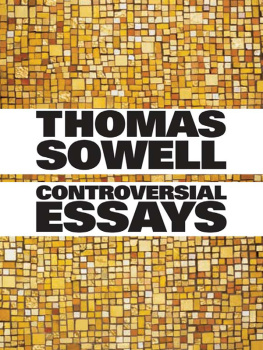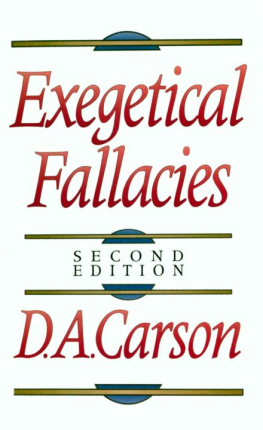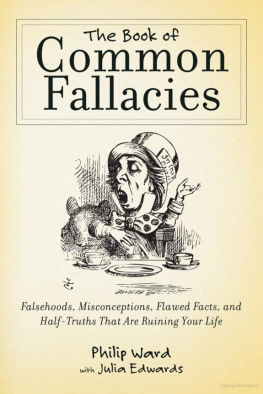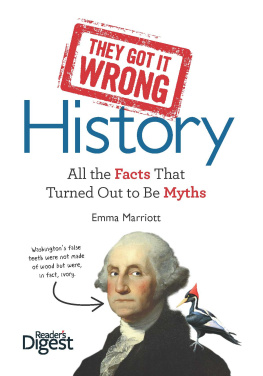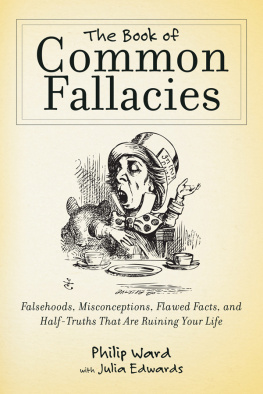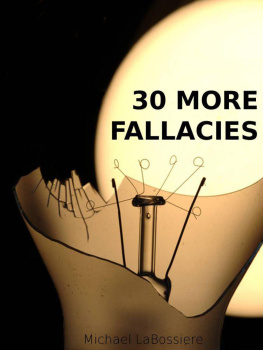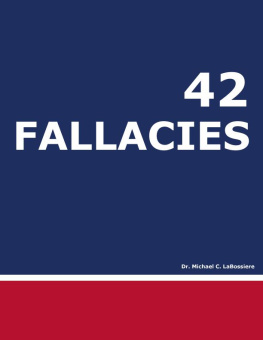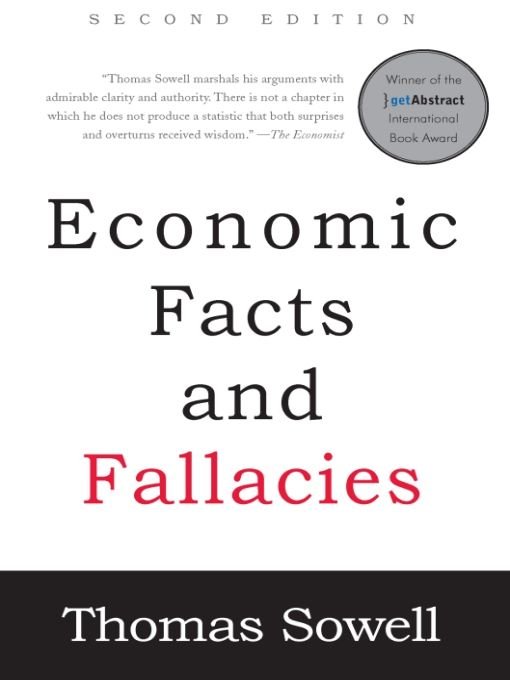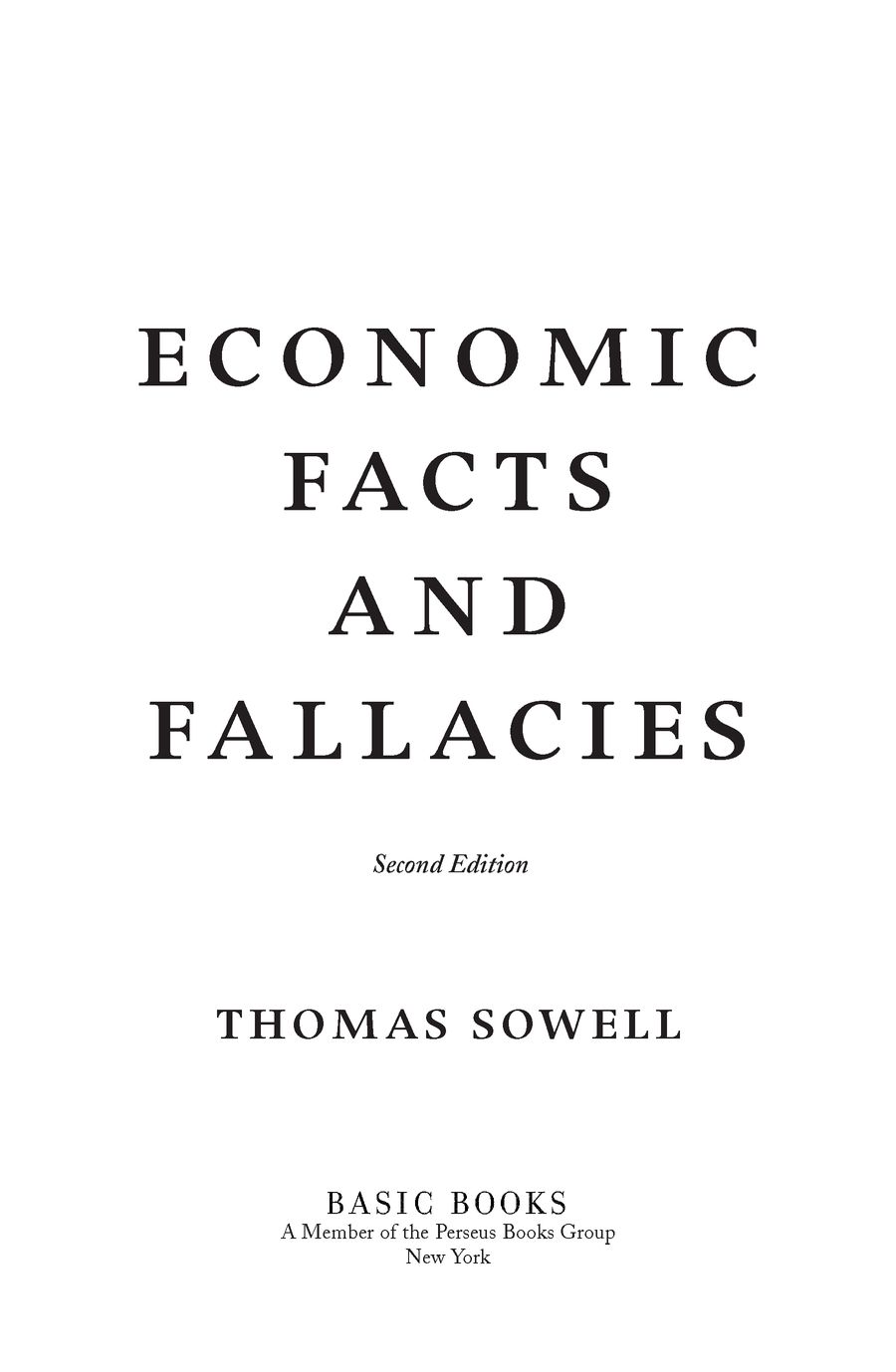Table of Contents
Facts are stubborn things; and whatever may be our wishes, our inclinations, or the dictates of our passions, they cannot alter the state of facts and evidence.
John Adams
PREFACE
Some things are believed because they are demonstrably true. But many other things are believed simply because they have been asserted repeatedlyand repetition has been accepted as a substitute for evidence.
This new edition of Economic Facts and Fallacies, like the original edition, subjects many widely held beliefs to the test of hard factsand finds that many beliefs cannot survive that test, including some that collapse like a house of cards and others where the truth turns out to be the direct opposite of what has been so often asserted.
The purpose of all this is not simply a debunking, in order to conduct a sort of demolition derby of ideas, but to reveal fallacies that have had harmful effects on the well-being of millions of people in countries around the world. Economic policies based on fallacies can beand have beendevastating in their impacts. Seeing through those fallacies is more than an intellectual exercise because a clearer understanding of economics can open up many unsuspected opportunities for higher standards of living for whole nations.
This book, like others of mine, owes much to my two extraordinary research assistants, Na Liu and Elizabeth Costa. They not only found much material that I asked for, they often brought to my attention valuable material that I had not asked for. In addition, Ms. Costa did the copy editing and Ms. Liu created the computer files from which this book was printed.
Thomas Sowell
Hoover Institution
Stanford University
Chapter 1
THE POWER OF FALLACIES
Never underestimate the difficulty of changing false beliefs by facts.
Henry Rosovsky
Fallacies are not simply crazy ideas. They are usually both plausible and logicalbut with something missing. Their plausibility gains them political support. Only after that political support is strong enough to cause fallacious ideas to become government policies and programs are the missing or ignored factors likely to lead to unintended consequences, a phrase often heard in the wake of economic or social policy disasters. Another phrase often heard in the wake of these disasters is, It seemed like a good idea at the time. That is why it pays to look deeper into things that look good on the surface at the moment.
Sometimes what is missing in a fallacy is simply a definition. Undefined words have a special power in politics, particularly when they invoke some principle that engages peoples emotions. Fair is one of those undefined words which have attracted political support for policies ranging from Fair Trade laws to the Fair Labor Standards Act. While the fact that the word is undefined is an intellectual handicap, it is a huge political advantage. People with very different views on substantive issues can be unified and mobilized behind a word that papers over their differing, and sometimes even mutually contradictory, ideas. Who, after all, is in favor of unfairness? Similarly with social justice, equality, and other undefined terms that can mean wholly different things to different individuals and groupsall of whom can be mobilized in support of policies that use such appealing words.
Fallacies abound in economic policies affecting everything from housing to international trade. Where the unintended consequences of these policies take years to unfold, the effects may not be traced back to their causes by many people. Even when the bad consequences follow closely after a given policy, many people still may not connect the dots, and advocates of policies that backfire often attribute these bad consequences to something else. Sometimes they claim that the bad situation would have been even worse if it had not been for the wonderful policies they advocated.
There are many reasons why fallacies have staying power, even in the face of hard evidence against them. Elected officials, for example, cannot readily admit that some policy or program that they advocated, perhaps with great fanfare, has turned out badly, without risking their whole careers. Similarly for leaders of various causes and movements. Even intellectuals or academics with tenure stand to lose prestige and suffer embarrassment when their notions turn out to be counterproductive. Others who think of themselves as supporters of things that will help the less fortunate would find it painful to confront evidence that they have in fact made the less fortunate worse off than before. In other words, evidence is too dangerouspolitically, financially and psychologicallyfor some people to allow it to become a threat to their interests or to their own sense of themselves.
No one likes to admit being wrong. However, in many kinds of endeavors, the costs of not admitting to being wrong are too high to ignore. These costs force people to face reality, however reluctantly and however painful that might be. A student who misunderstands mathematics has little choice but to correct that misunderstanding before the next examination, and someone in business cannot continue losing money indefinitely by persisting in mistaken beliefs about the market or about the way to run a business. In short, there are practical as well as intellectual imperatives to see through fallacies. The difference between sound and fallacious economic policies by a government can affect the standard of living of millions. That is what makes the study of economics importantand the exposure of fallacies more than an intellectual exercise.
There are far too many fallacies to list them all. However, we can sketch five widespread kinds of general economic fallacies here, and then investigate more specific fallacies in detail in the chapters that follow. These five widespread kinds of fallacies may be called the zero-sum fallacy, the fallacy of composition, the post hoc fallacy, the chess-pieces fallacy, and the open-ended fallacy.
THE ZERO-SUM FALLACY
Many individual fallacies in economics are founded on the larger, and usually implicit, fallacious assumption that economic transactions are a zero-sum process, in which what is gained by someone is lost by someone else. But voluntary economic transactionswhether between employer and employee, tenant and landlord, or international tradewould not continue to take place unless both parties were better off making these transactions than not making them. Obvious as this may seem, its implications are not always obvious to those who advocate policies to help one party to these transactions.
Let us start at square one. Why do economic transactions take place at all and what determines the terms of those transactions? The potential for mutual benefit is necessary but not sufficient, unless the transactions terms are in fact mutually acceptable. Each side may of course prefer terms that are especially favorable to themselves but they will accept other terms rather than lose the benefits of making the transaction altogether. There may be many terms acceptable to one side or the other but the only way transactions can take place is if these sets of terms acceptable to each side overlap.
Suppose that a government policy is imposed, in the interest of helping one sidesay, employees or tenants. Such a policy means that there are now three different parties involved in these transactions and only those particular terms which are simultaneously acceptable to all three parties are legally permitted. In other words, these new terms preclude some terms that would otherwise be mutually acceptable to the parties themselves. With




